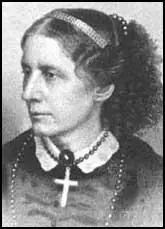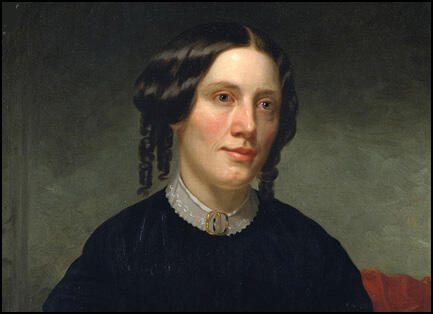Harriet Beecher Stowe

Harriet Beecher, the daughter of the Congregationalist minister, Lyman Beecher, was born in Litchfield, Connecticut, on 14th June, 1811. Her brother was the famous preacher, Henry Ward Beecher. After an education at the Connecticut Female Seminary she taught at schools in Hartford and Cincinnati.
In 1834 Harriet began to write short stories for the Western Monthly. Two years later she married the Rev. Calvin Ellis Stowe, a clergyman and biblical scholar. Over the next few years Harriet had seven children but continued to write stories and articles for numerous magazines.
Harriet was converted to anti-slavery campaign after hearing Theodore Weld speak at a public meeting. She was determined to do something to help the cause. One day, while in church, she decided to write a novel about slavery. The main character in the book was based on Josiah Henson, an escaped slave whose narrative Harriet had read. Weld's book, American Slavery As It Is: Testimony of a Thousand Witnesses, also provided her with plenty of background material.
Uncle Tom's Cabin was written as a serial and began appearing in the anti-slavery journal, The National Era, in 1851. It was published in book form the following year. In the preface Stowe wrote: "The object of these sketches is to awaken sympathy and feeling for the African race, as they exist among us; to show their wrongs and sorrows, under a system so necessarily cruel and unjust as to defeat and do away with the good effects of all that can be attempted for them by their best friends."
The publisher decided to print 5,000 copies of Uncle Tom's Cabin. It was an immediate best-seller. The first edition sold out in seven days. Despite being banned in the South, over 300,000 copies were sold in its first year. As Frederick Douglass was later to point out: "Its effect was amazing, instantaneous and universal".
Translated into many languages, Uncle Tom's Cabin was also a great success in Europe. In England alone over a million copies were sold. Supporters of slavery were furious and Stowe received hundreds of hostile letters. Thirty pro-slavery novels were published in an attempt to reverse public sympathies in what had now become a propaganda battle. Stowe responded by publishing The Key to Uncle Tom's Cabin (1853), a book of source material on slavery.

Stowe visited England where she met Queen Victoria. She also made three tours of Europe and this inspired her book Sunny Memories of Foreign Lands (1854). A second anti-slavery novel, Dred: A Tale of the Great Dismal Swamp appeared in 1856. The story of a slave rebellion was followed by The Minister's Wooing (1859).
Other books written by Stowe include Agnes of Sorrento (1862), Oldtown Folks (1869) Pink and White Tyranny (1871) and We And Our Neighbours (1875).
Harriet Beecher Stowe died on 1st July, 1896.
Slavery in the United States (£1.29)
Primary Sources
(1) Harriet Beecher Stowe, The Key to Uncle Tom's Cabin (1853)
The author will now enter into a consideration of slavery as it stands revealed in slave law. What is it according to the definition of law-books and legal interpreters? "A slave," says the law of Louisiana, "is one who is in the power of a master to whom he belongs. The master may sell him, dispose of his person, his industry, and his labour; he can do nothing, possess nothing, nor acquire anything, but what must belong to his master." South Carolina says: "Slaves shall be deemed, sold, taken, reputed, and adjudged in law, to be chattels personal in the hands of their owners and possessors, and their executors, administrators, and assigns, to all intents, constructions and purposes whatsoever." The law of Georgia is similar. Judge Ruffin, pronouncing the opinion of the Supreme Court of North Carolina, says a slave is "one doomed in his own person, and his posterity, to live without knowledge, and without the capacity to make anything his own, and to toil that another may reap the fruits.'
This is what slavery is, this is what it is to be a slave! The slave-code, then, of the Southern States, is designed to keep millions of human beings in the condition of chattels personal; to keep them in a condition in which the master may sell them, dispose of their time, person, and labour; in which they can do nothing, possess nothing, and acquire nothing, except for the benefit of the master; in which they are doomed in themselves and in their posterity to live without knowledge, without the power to make anything their own, to toil that another may reap. The laws of the slave-code are designed to work out this problem, consistently with the peace of the community, and the safety of that superior race which is constantly to perpetrate this outrage.
(2) Harriet Beecher Stowe, The Key to Uncle Tom's Cabin (1853)
With what face can we exhort our Southern brethren to emancipate their slaves, if we do not set the whole moral power of the Church at the North against such abuses as this? Is this course justified by saying that the negro is vicious and idle? This is adding insult to injury.
What is it these Christian States do? To a great extent they exclude the coloured population from their schools; they discourage them from attending their churches by invidious distinctions; as a general fact, they exclude them from their shops, where they might learn useful arts and trades; they crowd them out of the better callings where they might earn an honourable livelihood; and having thus discouraged every elevated aspiration, and reduced them to almost inevitable ignorance, idleness, and vice, they fill up the measure of iniquity by making cruel laws to expel them from their States, thus heaping up wrath against the day of wrath.
(3) Harriet Beecher Stowe, The Key to Uncle Tom's Cabin (1853)
The thing to be done, of which I shall chiefly speak, is, that the whole American Church, of all denominations, should unitedly come up, not in form, but in fact, to the noble purpose avowed
by the Presbyterian Assembly of 1818, to seek the entire abolition of slavery throughout America and throughout Christendom.
To this noble course the united voice of Christians in all other countries is urgently calling the American Church. She must undertake it because she alone can perform the work peaceably. If this fearful problem is left to take its course as a mere political question, to be ground out between the upper and nether millstones of political parties, then what will avert agitation, angry collisions, and the desperate rending of the Union? No, there is no safety but in making it a religious enterprise, and pursuing it in a Christian spirit, and by religious means.


